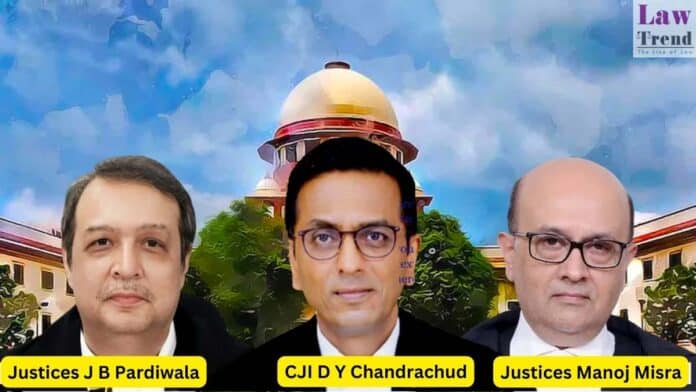The Supreme Court has agreed to hear a plea by an NGO against any reduction in the age of consent, saying it jeopardises the interest of a large number of child victims of sexual abuse, especially girls.
A bench of Chief Justice DY Chandrachud and justices JB Pardiwala and Manoj Mishra issued notice to the Centre and tagged the plea of ‘Bachpan Bachao Andolan’ with a pending petition filed by the National Commission for Protection of Child Rights (NCPCR).
The NCPCR had challenged last year’s order of the Punjab and Haryana High Court which said that a minor Muslim girl can marry a person of her choice.
The apex court on Friday sought the Centre’s response on the issue.
The plea of the NGO, besides seeking a slew of directions and guidelines, has also sought a directive to the courts to refrain from making observations regarding the minor victim’s casual relationship and promiscuous attitude while dealing with the criminal proceedings under the POCSO Act.
It has said that the dissemination of misinterpreted information pertaining to POCSO cases (Protection of Children from Sexual Offences Act, 2012) as “elopement and romantic relationships” has undermined the spirit and purpose of the stringent legislation.
It also challenged the circular issued on December 3, 2022 by the office of the Director General of Police, Tamil Nadu directing the police officials to not show haste in effecting an arrest of the accused in mutual romantic cases, alleging thereby most of them fell category of “mutual romantic relationships”.
The NGO also highlighted that despite official facts and figures, various NGOs, governments, and/or law enforcement authorities have relied on flawed methodologies and wrongly interpreted that 60 to 70 percent of POCSO cases are pertaining to consenting minors and fall under the category of “consensual romantic relationship” between teenagers that often get criminalised.
It said that the alleged figure of 60-70 per cent is incorrect since the total number of cases between 16-18 years is approximately 30 per cent of the total POCSO cases in the country.
The organisation has further claimed that a survey conducted by support persons reveals that only 13 per cent of the total POCSO Cases are alleged to be consensual in nature.
On October 17 last year, the top court agreed to examine a plea of the NCPCR challenging the Punjab and Haryana High Court’s June 13, 2022 order that a minor Muslim girl can marry a person of her choice.
Also Read
The apex court had appointed advocate Rajshekhar Rao as amicus curiae in the matter and said that it was not going to interfere with the order of the high court but would examine the question of law involved in the issue.
It had, however, on January 13 ordered that the final judgement of the High Court dated September 30, 2022, shall not be relied on as a precedent in any other case.
Several other petitions have been filed on the same issue of the age of consent, which have been tagged along with the NCPCR’s plea.
The single-judge bench of the high court on June 13, last year had passed the order on a plea by a Pathankot-based Muslim couple who had approached the court for protection.
The high court had said the issue for consideration in the case was not with regard to the validity of the marriage but to address the apprehension raised by the petitioners of danger to their life and liberty.
It had directed the Senior Superintendent of Police, Pathankot, to decide the representation of the petitioners and take necessary action as per law.




